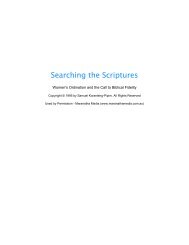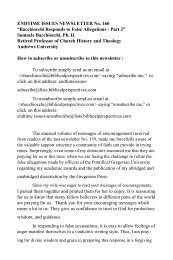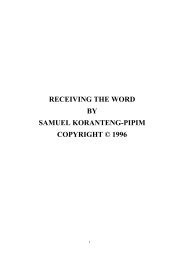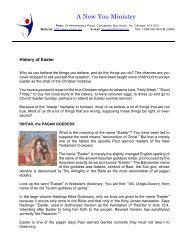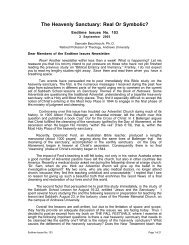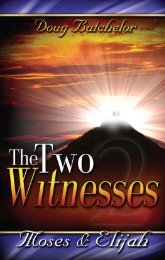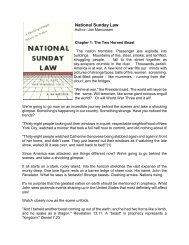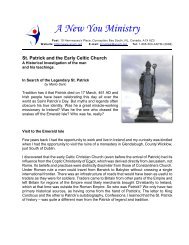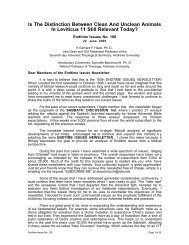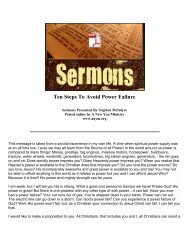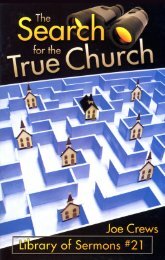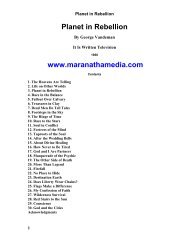Bible Readings for the Home Circleâ1914 - A New You Ministry
Bible Readings for the Home Circleâ1914 - A New You Ministry
Bible Readings for the Home Circleâ1914 - A New You Ministry
You also want an ePaper? Increase the reach of your titles
YUMPU automatically turns print PDFs into web optimized ePapers that Google loves.
BIBLE READINGS<br />
name, small and great; and shouldest destroy <strong>the</strong>m which destroy <strong>the</strong> earth.”<br />
Verse 18.<br />
NOTES.— The closing scenes of this world’s history and <strong>the</strong> judgment<br />
are clearly brought to view here. Ever since <strong>the</strong> loss of independence<br />
by <strong>the</strong> Ottoman Empire in 1840, <strong>the</strong> nations have been preparing<br />
<strong>for</strong> war as never be<strong>for</strong>e, in view of international complications and a<br />
world war which all fear is inevitable upon <strong>the</strong> dissolution of Turkey<br />
and <strong>the</strong> final disposition of it’s territory. Towering above all o<strong>the</strong>rs, <strong>the</strong><br />
Eastern question has been <strong>the</strong> one of paramount concern to <strong>the</strong>m.<br />
The investigative judgment began in heaven in 1844, at <strong>the</strong> close<br />
of <strong>the</strong> prophetic period of 2300 days. See readings on pages 233–253.<br />
When this is finished, <strong>the</strong> time of reward will have arrived, <strong>the</strong> end will<br />
have come, and <strong>the</strong> saints will <strong>the</strong>mselves sit in judgment. See Rev.<br />
20:4; 1 Cor. 6:1–3.<br />
22. What scene in heaven was presented to <strong>the</strong> prophet as <strong>the</strong> seventh<br />
trumpet was about to sound<br />
“And <strong>the</strong> temple of God was opened in heaven, and <strong>the</strong>re was seen in<br />
His temple <strong>the</strong> ark of His testament: and <strong>the</strong>re were lightnings, and voices,<br />
and thunderings, and an earthquake, and great hail.” Rev. 11:19.<br />
NOTES.— This <strong>for</strong>cibly calls attention to <strong>the</strong> closing work of Christ in<br />
<strong>the</strong> second apartment, or most holy place, of <strong>the</strong> sanctuary in heaven,<br />
which began in 1844. See readings referred to in preceding note. The<br />
reference to <strong>the</strong> ark of God’s testament is a <strong>for</strong>cible reminder also of that<br />
which is to be <strong>the</strong> standard in <strong>the</strong> judgment,—<strong>the</strong> law of God, or ten<br />
commandments. See Eccl. 12:13, 14; Rom. 2:12, 13; James 2:8–12.<br />
From its closing words—<strong>the</strong> reference to “great hail”—<strong>the</strong> seventh<br />
trumpet evidently embraces <strong>the</strong> seven last plagues (see Rev.<br />
16:17, 18); and from its opening words—“<strong>the</strong> kingdoms of this world<br />
are become <strong>the</strong> kingdoms of our Lord”—it marks <strong>the</strong> setting up of<br />
God’s everlasting kingdom.<br />
THE EASTERN QUESTION<br />
{296<br />
296}<br />
1. WHAT, briefly stated, is <strong>the</strong> Eastern question<br />
The driving out of Turkey from Europe, and <strong>the</strong> final extinction of <strong>the</strong><br />
Turkish Empire, with <strong>the</strong> world-embracing events that follow [By 2006,<br />
this may include radical Islam in whatever country, thus helping to prepare<br />
<strong>the</strong> whole world to “wander after <strong>the</strong> beast”]. It has been o<strong>the</strong>rwise described<br />
as “<strong>the</strong> driving of <strong>the</strong> Turk into Asia, and a scramble <strong>for</strong> his territory.”<br />
2. What scriptures are devoted to <strong>the</strong> Turkish power<br />
THE EASTERN QUESTION<br />
Dan. 11:40–45; Revelation 9; and Rev. 16:12.<br />
NOTE.— In <strong>the</strong> eleventh chapter of Daniel, Turkey is dealt with under<br />
<strong>the</strong> title of <strong>the</strong> “king of <strong>the</strong> north;” in Revelation 9, under <strong>the</strong> sounding<br />
of <strong>the</strong> fifth and sixth “trumpets;” and in Revelation 16, under <strong>the</strong> symbol<br />
of <strong>the</strong> drying up of <strong>the</strong> water of <strong>the</strong> chief river of <strong>the</strong> Turkish<br />
Asiatic possessions, “<strong>the</strong> great river Euphrates.” The actual drying<br />
up of <strong>the</strong> river Euphrates was <strong>the</strong> signal <strong>for</strong> <strong>the</strong> overthrow of ancient<br />
Babylon.<br />
3. When did Turkey take Constantinople, and thus <strong>the</strong> nor<strong>the</strong>rn<br />
division of ancient Greece and Rome<br />
In A.D. 1453, under Mohammed II. See pages 293, 294.<br />
NOTE.— After <strong>the</strong> death of Alexander <strong>the</strong> Great, <strong>the</strong> Grecian Empire was<br />
divided by his four leading generals, Cassander, Lysimachus, Seleucus,<br />
and Ptolemy, into four parts,—east, west, north, and south,—<strong>the</strong> first<br />
three of which were shortly afterward absorbed into one kingdom, <strong>the</strong><br />
kingdom of <strong>the</strong> north, Egypt remaining <strong>the</strong> king, or kingdom, of <strong>the</strong> south.<br />
In <strong>the</strong> breaking up of <strong>the</strong> of <strong>the</strong> Roman Empire, <strong>the</strong> Turks gained<br />
possession of <strong>the</strong> Holy Land in A.D. 1058, and finally of Constantinople,<br />
and considerable portions of eastern Europe—<strong>the</strong> kingdom of <strong>the</strong><br />
north—in 1453, to which, with varying <strong>for</strong>tunes and shrinking geographical<br />
boundaries, it has held ever since.<br />
4. How has Turkey been regarded by European nations {297<br />
297}<br />
“The Turks have ever remained quite insensible to <strong>the</strong> influences of<br />
European civilization, and <strong>the</strong>ir government has been a perfect blight and<br />
curse to <strong>the</strong> countries subject to <strong>the</strong>ir rule. They have always been looked<br />
upon as intruders in Europe, and <strong>the</strong>ir presence <strong>the</strong>re has led to several of<br />
<strong>the</strong> most sanguinary wars of modern times. Gradually <strong>the</strong>y have, been<br />
pushed out from <strong>the</strong>ir European possessions, and <strong>the</strong> time is probably not<br />
very far distant when <strong>the</strong>y will be driven back across <strong>the</strong> Bosporus.” Myers’s<br />
“General History,” edition 1902, page 463.<br />
5. When did <strong>the</strong> independence of Turkey cease<br />
In 1840, at <strong>the</strong> close of a two years’ war between Turkey and Egypt,<br />
when <strong>the</strong> fate of Turkey was placed in <strong>the</strong> hands of four great powers of<br />
Europe,—England, Russia, Austria, and Prussia. See page 294, under question<br />
19.<br />
6. What is one of <strong>the</strong> last predictions of <strong>the</strong> prophecy of Daniel concerning<br />
<strong>the</strong> king of <strong>the</strong> north<br />
“But tidings out of <strong>the</strong> east and out of <strong>the</strong> north shall trouble him:<br />
<strong>the</strong>re<strong>for</strong>e be shall go <strong>for</strong>th with great fury to destroy, and utterly to make<br />
away many.” Dan. 11:44.<br />
NOTE.— Upon this, Dr. Adam Clarke, writing in 1825, said: “If <strong>the</strong> Turkish<br />
power be understood, as in <strong>the</strong> preceding verses, it may mean that <strong>the</strong><br />
Persians on <strong>the</strong> east and <strong>the</strong> Russians on <strong>the</strong> north will at some time




